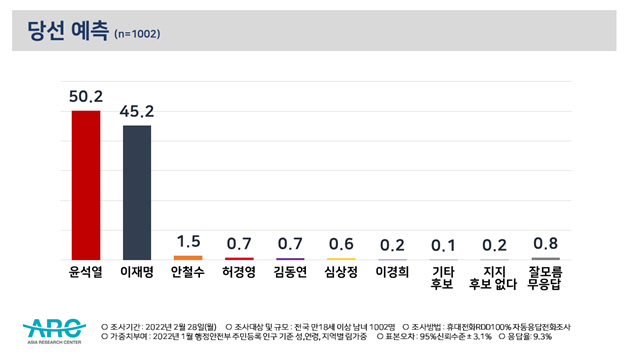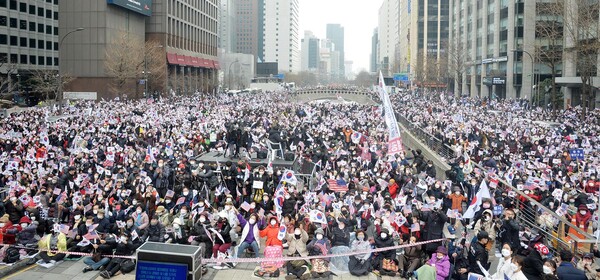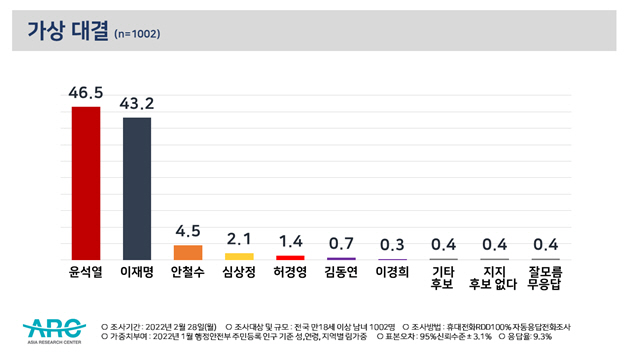In the final poll related to the presidential election conducted before public opinion polls are banned, Yoon Seok-youl, the candidate from the People Power Party, was found to be leading ahead of Lee Jae-myung of the Democratic Party of Korea.
According to a survey with 1,002 adult men and women participating nationwide on the February 28 commissioned to Asia Research & Consulting, Yoon was ahead of Lee, with 46.5 percent and 43.2 percent respectively.
When asked if they intended to vote on March 9, 95.6 percent of the respondents said they would “definitely vote.” 2.7 percent of the respondents said that they would “vote if circumstances allowed” and only 0.4 percent of the respondents said they would not vote. According to these responses, it could be seen that this election may be the highest turnout in the 2000s, breaking the record of 77.2 percent of the 19th presidential election.
Yoon topped the survey with 46.5 percent in a simulated contest and Lee came in at second with 43.2 percent. People Party’s candidate Ahn Cheol-soo received 4.5 percent, Justice Party’s candidate Sim Sang-jung received 2.1 percent, and National Revolutionary Dividends Party’s candidate Huh Kyung-young received 1.4 percent. Yoon was also leading ahead of Lee in all age groups except those in their 40s and 50s.
By region, Yoon dominated Seoul (48.2 percent), Daegu and Gyeongbuk (55.9 percent), Busan, Ulsan, Gyeongnam (54.6 percent), and Gangwon and Jeju (52.3 percent). Whereas Lee dominated Gwangju, Jeonnam, Jeonbuk (65.9 percent), and Daejeon, Sejong, Chungnam, and Chungbuk (50 percent). Gyeonggi and Incheon showed little difference between Yoon (44.3 percent) and Lee (44.1 percent).

Apart from support, Yoon also topped the survey with 50.2 percent of the respondents answering that he was most likely to win the election, whereas Lee received 45.2 percent. It was once again confirmed that Ahn is far from winning the election with only 1.5 percent responding that he was likely to win.
Amid the arguments over who was responsible for the breakdown of party unification between Yoon and Ahn, 48.2 percent of the respondents said that Yoon was responsible for the breakdown and 41.5 percent said Ahn was responsible.
When asked about the nature of this presidential election, 51.3 percent of the respondents answered it was a “change of government to the opposition party to correct the wrong state affairs,” which was higher than 39.3 percent of the respondents saying it was about “the ruling party should continue the administrative power.”
Support for the political parties was found to be that 40.0 percent supported the People’s Power Party (PPP), 34.8 percent for the Democratic Party of Korea (DP), 6.4 percent for the People Party, 4.0 percent for the Justice Party, 3.1 percent for the National Revolutionary Dividends Party, and 9.5 percent responded that they supported no party.
Under the Public Official Election Act, publication of all poll results will be prohibited a week before the election day, which is March 3. While Yoon and Lee are neck-and-neck in this race within the margin of error, this coming week, called the “blind week,” will determine who will win this election by solidifying its supporters and how many new supporters they will be able to win over.
This survey was conducted on February 28 nationwide with 1,002 adult men and women, using an automated telephone response (ARS) method using a structured questionnaire.
The response rate was 9.3 percent, and the collected responses were compared based on the Ministry of Public Administration and Security’s January 2022 census data of demographics by gender, age, and region. The margin of error is at ±3.1 percent at 95 percent reliability.
More details on this survey can be found at the National Election Survey Deliberation Commission.

Original article: https://www.jayupress.com/news/articleView.html?idxno=2878


